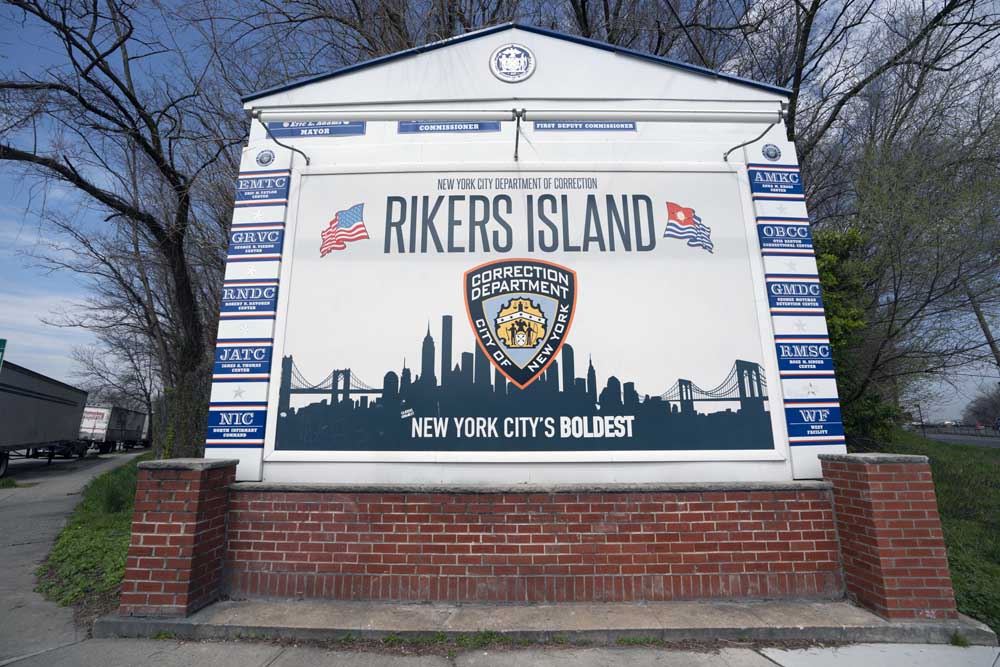An epidemic of adult children killing their parents in NYC raises troubling issues
Published 3:05 pm Sunday, August 25, 2024

- The sign at the entrance to Rikers Island, the largest psychiatric provider in New York City. In fiscal year 2023, over half of the jail’s population had a mental health diagnosis and around 19% had a serious mental health diagnosis. (Barry Williams/New York Daily News/TNS)
Vianel Garcia worked hard trying to find help for her mentally ill son in a city where resources are scarce and barriers daunting.
Trending
But in the end, she died at his hands.
In a brutal attack that sparked headlines across New York City, her 22-year-old son Miguel Duval allegedly pushed her down the side of a Riverside Park embankment near Riverside Drive and W. 165th Street in Washington Heights. He tumbled with her, then fatally beat her with a tree branch and bottle at the bottom of the slope, according to police. Duval was charged with murder and held at a hospital in the aftermath of the attack; he’s pleaded not guilty.
“She tried to reach out to so many people, organizations for help,” said Maribel Masso, a longtime friend of Garcia’s. “She asked so many people for help for her son. That’s what she wanted — for him to get help … It hurts that the last thing she saw was him taking her life.
Trending
“She still loved this young boy. She loved her son.”
Garcia’s death is part of an alarming trend. In the past year, there have been at least six cases of adult children killing their parents with some indication a psychiatric illness may have played a role.
The grisly incidents include a Bensonhurst man now facing murder charges after allegedly stabbing his mother to death and strangling his sister-in-law, 5-year-old niece and 4-year-old nephew in the family’s apartment in July; a man who allegedly beat his elderly father to death and threw a printer at his mother’s head in March; and an adult son accused of stabbing his septuagenarian parents to death in January.
The violent episodes, though varied, all point to a similar problem: There are vast shortfalls for parents of adults with severe mental illness.
Families often lack the time, money and resources to provide the level of care their children need, plus, parents with children over the age of 18 don’t have any say in treatment plans and can’t force their children to go to a doctor or hospital.
This all puts both parents and the children at risk, with adults with severe mental illness often winding up homeless or in jail with their disorders left unchecked and often worsening.
“The parents are left without options for intervention up to and until the point at which the child’s state of deterioration is so extreme that they’re deemed to constitute a danger to themselves or to other people,” said Dr. Paul Appelbaum, the director of the division of law, ethics and psychiatry at Columbia. “The parents themselves may be at risk, the child may be at risk, and other people around them may be at risk, but until that point arrives, involuntary treatment can’t be triggered.”
Families ill-equipped
Miguel Duval had been experiencing mental health challenges well before the July incident, sometimes having angry outbursts, friends and neighbors told the New York Daily News. He had been at the Bellevue Men’s shelter in Manhattan but had to be transferred out due to issues he had at the shelter, Masso, the friend, said.
Garcia, his mom, would sometimes implore Duval to go to the hospital, but he would refuse.
When he had an altercation at the Fort Washington shelter, the shelter called in his mom to calm him down — a mistake, the friend said, that put Garcia in danger.
“We shouldn’t have to wait for someone to snap at the shelter, to then refer them somewhere else, because that’s what happened to Miguel,” Masso said of her friend’s son. “He had a lot of issues there with other clients, and we ended up putting him where he was at. We transferred him to the Fort Washington mental health shelter, but even that, look how long it took for him to even see the doctor over there.”
In the end, Masso said, it was the lack of help Garcia so desperately sought that led to the end of her life. Now, Masso is leading a campaign to rename the block of Garcia’s beloved hair salon after her and is pushing to make changes in the city’s mental health laws.
This lack of resources can also mean that signs of a developing mental illness can be difficult to identify for families, especially in cases when disorders like schizophrenia or bipolar develop in a person’s adolescence.
In November of last year, Jayden Rivera confessed to hearing voices, police said, that told him to kill his family — and the 19-year-old went on a bloody spree that left his father, half-brother and father’s girlfriend dead.
This was a psychiatric episode, an exam showed afterward, according to Jayden’s former lawyer. Jayden’s family wasn’t aware of his mental illness — they likely didn’t have the expertise or resources to recognize his condition. And by the time it was made strikingly clear to them, it was too late.
“There is a small percentage of the population who live with serious mental illness who may, if left untreated, become violent, and if people are allowed to get there, it’s really, in my view, a complete failure of the mental health system,” said Matt Kudish, executive director of the National Alliance on Mental Illness of New York City.
Nowhere to turn
The root of the problem has been well documented, often discussed but nonetheless persistent: The city is lacking enough psychiatrists and mental health care workers, hospital beds and treatment options to meet the enormous need for those with mental illness and their families.
Mental illness is also disproportionately tied to poverty, with serious psychological distress affecting people living with food insecurity at three times the rate of those who aren’t, according to city data. An estimated two million New Yorkers live in poverty.
The outcomes are often troubling. Rikers Island is the largest psychiatric provider in New York City. In fiscal year 2023, over half of the jail’s population had a mental health diagnosis and around 19% had a serious mental health diagnosis. Many also wind up homeless, sleeping on the streets or on trains.
And parents trying to navigate a world they aren’t equipped for can lead to tragedy.
Earlier this month, a Bensonhurst man allegedly stabbed his mother to death and strangled his sister-in-law, 5-year-old niece and 4-year-old nephew in the family’s apartment. Shahboz Rajabboev, 24, told police he was on psychedelic mushrooms and didn’t know what happened, but neighbors said the man had seemed to be mentally deteriorating and growing increasingly violent and erratic. He pleaded not guilty at his arraignment last month.
In March, Leo Macbryde Jr. was charged with several counts of assault and criminal possession of a weapon for pummeling his father, 79, to death and throwing a printer at his mother’s head after the parents confronted him about his treatment in March, in their Corona, Queens, home. He pleaded not guilty.
The son told cops after the fact that he and his parents were arguing about “his treatment and change in behavior.”
“His blood began to boil,” according to court papers.
The elderly parents of Meyer Sperber had been trying to get their son mental health treatment, neighbors said, before Sperber, 48, allegedly stabbed them both to death in January. The couple had struggled to care for their troubled son as his mental condition deteriorated, friends and neighbors told the News. Sperber was institutionalized for months at a time at least twice, a family friend said in January.
“The family wanted to call the ambulance, but the mother said she could handle it for the weekend, and after the weekend they would make an appointment with the psychiatrist,” the friend said.
“Then what happened, happened.”
“We hear all the time about people slipping through the cracks,” Kudish said. “Those cracks exist because we don’t have a community mental health and a system that is actually able to keep people well and give them the resources they need.”
Aside from more crisis respite centers, mental health walk-in care centers and other places where those with severe mental illness can go, Kudish said that families can benefit from educational classes or support groups, both of which the National Alliance on Mental Illness provides, to help foster better communication and family relationships.
Masso said that Garcia’s family and loved ones have a right to be angry, but she pushed back on the idea that Duval needs to be locked up for life for what he did to his mom.
“Is that what she would have wanted? No,” Masso said. “If you knew her, you would know she would want him to still get help. She wasn’t gonna hate him.”
_____









